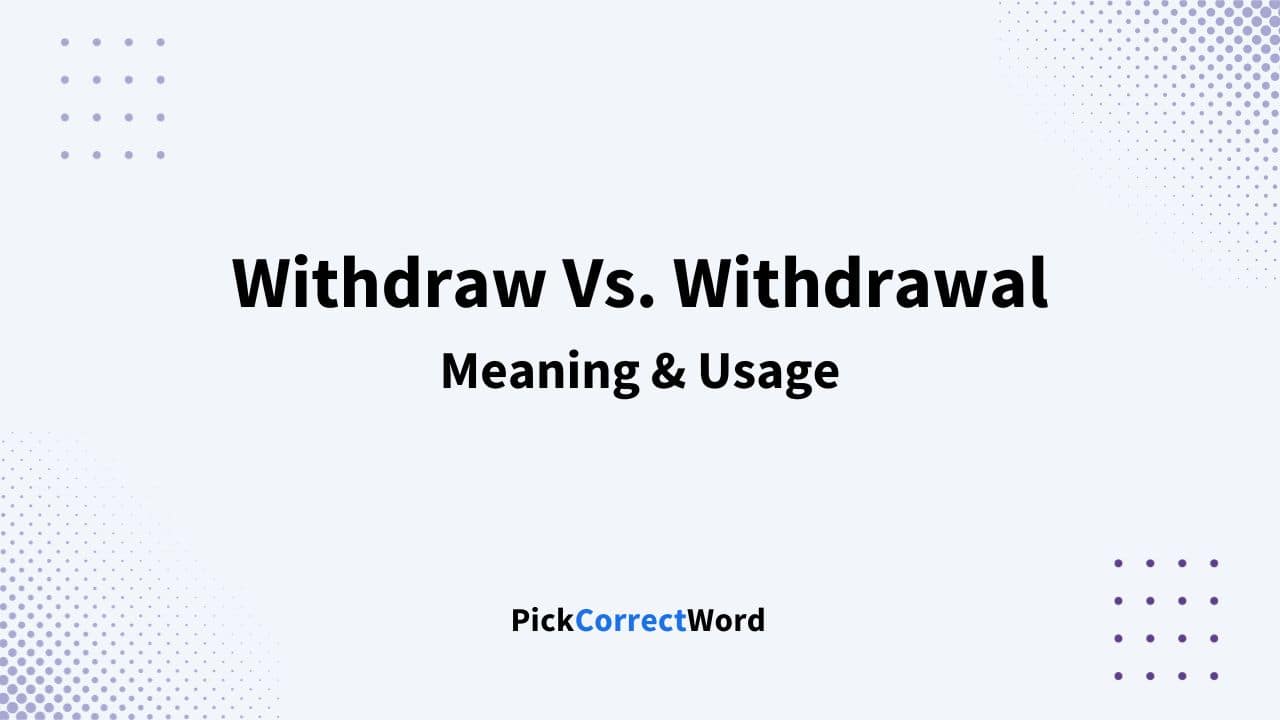The word withdraw is a verb that means to take out or remove something, usually money, from a place like a bank. For example, you might withdraw cash from your account using an ATM.
On the other hand, withdrawal can refer to both the action of taking out money and the actual amount that is taken out.
Neither word is incorrect; they are just used in different situations. Simple use of these words in the right context can make your communication in English more effective.
Withdraw or withdrawal? Which one should you use?
When you’re choosing between ‘withdraw’ and ‘withdrawal’, keep this in mind: ‘withdraw’ is a verb, which means it’s an action word. On the other hand, ‘withdrawal’ is a noun, which refers to the action or outcome of withdrawing.
Basic Definitions and Differences in Usage
Withdraw (verb): To take back; to remove oneself.
- Transitive verb example: You withdraw a book from the shelf.
- Intransitive verb example: You withdraw from the conversation.
Withdrawal (noun): The act of withdrawing; the state post-withdrawal.
- Noun example: Your withdrawal of funds may take a few days to process.
When a preposition follows ‘withdraw’, such as ‘from’, ‘to’, or ‘into’, it’s guiding who or what is involved or affected by the action of withdrawing.
Withdraw: Meaning and Usage
To get a grip on the verb “withdraw”, you need to understand its different uses and subtle shades of meaning in English. “Withdraw” mainly means taking something out from somewhere, stopping participation in an activity, or retracting an offer or statement.
How it’s used:
The verb “withdraw” can be used in various ways, each with a unique twist.
In banking, withdrawing means pulling money out of your bank account. You can do this at an ATM, through a bank teller, or via an online transaction.
In social or work settings, to withdraw could mean stepping back from an event or situation, usually because you’re uncomfortable or need some personal space. For example, you might withdraw from a party if it’s too much for you, or from a competition if you no longer want to compete.
When talking about communication, if you withdraw a statement, you’re taking back something you’ve said, maybe because it was wrong or caused harm.
In legal and formal situations, to withdraw could mean pulling back a legal claim or offer, showing that it’s no longer valid or up for discussion.
Examples:
Here are a few examples that illustrate the different ways “withdraw” can be used:
Financial: “After checking her bank balance, Jenna decided to withdraw $200 to pay for her textbooks.”
Social: “Feeling anxious in the crowded room, Mark chose to withdraw and spend some time alone in the garden.”
Competition: “Due to an unexpected injury, the leading athlete had to withdraw from the race, much to the disappointment of his fans.”
Communication: “Upon realizing that his comment had offended his colleague, Tom promptly apologized and withdrew his remark.”
Legal: “The plaintiff decided to withdraw the lawsuit after reaching an out-of-court settlement with the defendant.
Withdrawal: Meaning and Usage
Understanding of the noun “withdrawal” is key because it captures the action or process of withdrawing and has meanings that go beyond the immediate act.
“Withdrawal” points to the act or process of pulling back. It covers both the act of stepping back from a situation and the state or condition that comes from this act. The noun form expands the verb “withdraw” into a wider, often longer-lasting state or condition that comes from the act.
How it’s used:
As a noun, “withdrawal” can be used in different situations, like financial transactions, medical conditions, and emotional states. Each use has its own set of outcomes and things to think about. In finance, it refers to the amount of money you take out of an account. In medicine, it describes how the body reacts when a substance it’s used to is no longer given. In psychology, it can refer to the emotional and behavioral responses when addictive behaviors or social interactions are stopped.
Examples:
Financial: “The bank statement showed a withdrawal of $500, leaving the account balance quite low.”
Medical/Drug: “Withdrawal from long-term opioid use can be challenging and often requires medical supervision.”
Psychological: “Children sometimes exhibit signs of withdrawal when they are unable to cope with stress or change in their environment.”
Addiction: “Withdrawal symptoms can be a significant barrier for those attempting to quit smoking or reduce alcohol consumption.”
Social: “After his move to a new city, he experienced a sense of withdrawal due to the lack of familiar social networks.”
Frequently Asked Questions
When do we use ‘withdrawal’ to talk about symptoms, like those from substances or medications?
‘Withdrawal’ is about the symptoms you feel when you cut down or stop using a substance your body has gotten used to, like drugs, alcohol, or medication. This term highlights both the process and the symptoms, which we often call withdrawal symptoms.
What is the correct form to use when someone stops attending school—is it ‘withdraw’ or ‘withdrawal’
When a student stops attending school, the term ‘withdraw’ is the action they are performing, as in “The student decided to withdraw from the course.” ‘Withdrawal’ would often refer to the paperwork or action recorded by the school, documenting the student’s status after the action, as in “The withdrawal was processed by the registrar.”
In what situations should the past participle ‘withdrawn’ be used instead of ‘withdraw’?
‘Withdrawn’ is the past participle form of ‘withdraw’ and is used to describe an action that has been completed in the past. It’s also used as an adjective to describe someone who is not socially engaged and is typically isolated, for instance, “After the argument, she became withdrawn.”


